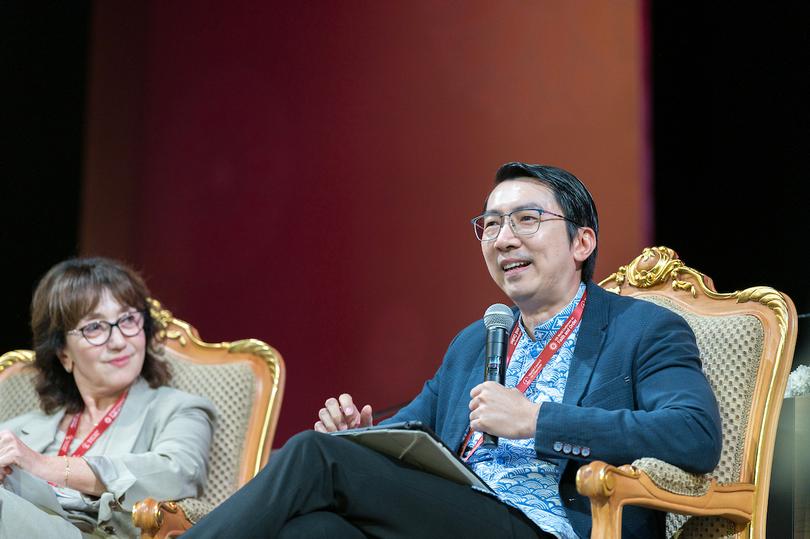At the Sixth World Conference on Faith and Order held at St. Bishoy Monastery in Wadi El Natrun, Egypt, from October 24-28, Dr. Victor Lee, president of the Bible College of Malaysia and pastor of First Assembly of God (Chinese) in Kuala Lumpur, shared with China Christian Daily about his ministry in theological education, his role in the World Council of Churches (WCC) as a Pentecostal representative, and his encouragement to Christians in China to contextualize the gospel and think globally.
China Christian Daily: Could you please introduce yourself?
Victor Lee: I'm Rev. Dr. Victor Lee. I lead the Bible College of Malaysia, which belongs to the Assemblies of God, a Pentecostal tradition. In addition to that, I serve on the national executive of the Assemblies of God and as a council member of the National Evangelical Christian Fellowship.
Because of my role as a member of the Pentecostal World Fellowship Christian Unity Commission, I represent the Pentecostal tradition in inter-church dialogue. Through that role, I was assigned to be part of the WCC's Faith and Order Commission.
China Christian Daily: Can you provide more information about the Assemblies of God Church?
Victor Lee: The Assemblies of God church originated in the United States. It is part of the Pentecostal movement that began in the late 19th century, when people experienced the power of the Holy Spirit and began to speak in tongues. From that experience, the mission became the central focus of the church, leading believers to bring their faith from the U.S. to many parts of the world, including Malaysia.
The Assemblies of God is now a worldwide movement and one of the classical Pentecostal denominations. We have our own tenets of faith, doctrines, and leadership structures. However, the way we are governed is very local—we follow an indigenous church model that emphasizes being self-supported, self-governed, and self-propagated within each local context.
In Malaysia, we have our own national council, the Assemblies of God of Malaysia. The Bible College of Malaysia, which I lead, belongs to this national body and serves as the national college that trains pastors and church leaders. We also welcome students from other denominations.
Previously, our program was primarily residential and full-time, but the dynamics of theological education have changed. Today, we have about 20-plus full-time students, and roughly 700 students are currently enrolled in our online programs.
China Christian Daily: Could you introduce the current situation of the church in Malaysia?
Victor Lee: In Malaysia, Christians make up only about 10% of the population, while the majority are Muslim. Because of this, Christians face certain restrictions. However, one positive outcome of this environment is that different denominations have learned to work closely together. We are well represented through the Christian Federation of Malaysia, which brings various denominations together to agree on common positions and represent the Christian community when engaging with the government.
At the same time, Christians are not growing biologically—we are not having as many children compared to the Muslim population.
However, we have seen the rise of many non-denominational churches. These churches often do not follow traditional liturgy; they are very free-form and sometimes experiment with unconventional practices—like having fashion shows or Olympic-style games in church. They are very creative and are attracting many people.
China Christian Daily: As the president of the seminary, how would you describe the current vision and direction of the Bible College of Malaysia under your leadership?
Victor Lee: The seminary was initially formed to train church planters, and it was very successful in the early 1970s when there was a strong church-planting movement. Today, we have many churches under the Assemblies of God in Malaysia, and the need has shifted from planting new churches to sustaining and strengthening existing ones. So, we now offer higher-level programs such as bachelor's and master's degrees to equip pastors.
Over time, we have also realized that church needs are becoming more complex, so we now train people in other areas of ministry as well. One of these areas is counseling. We saw this as an urgent need in local churches, as many people are struggling with stress, depression, and mental health challenges.
We also have many students who are professionals in the marketplace. They come to us wanting to be a good witness in the professional era in the marketplace. So, we teach about work ethics, faith integration in daily life, and dealing with workplace conflicts.
China Christian Daily: You are the youngest president of the seminary. As a member of the younger generation in leadership, what would you say to other young leaders who are stepping into similar roles?
Victor Lee: When I was nominated as president, I was only in my late 20s, and my former president was very trusting. We went through a transition process, and I was installed as president in my early 30s.
As a young president, people expect you to bring something new, but at the same time, you have to deal with long-standing traditions that have been passed down. One thing I've learned is that relationships are very important—especially in the Malaysian and Asian context.
In my leadership, I make many changes and propose new ideas, but I intentionally surround myself with a group of leaders who are all older than me. This way, I can always get feedback and perspectives from a different generation.
Of course, along the way, there will be pushback. But we just keep going. Don't hold grudges when that happens—stay relational. That's the key. Talk to the older generation, talk to the younger generation, and be the bridge between them. Eventually, things will move forward, but it takes time.
You also have to build emotional intelligence. Make sure you can handle criticism. When you build relationships long enough and earn people's trust, then you can begin to speak loudly.
China Christian Daily: The First Assembly of God began as a Chinese-language church. Could you share more about its origins and how it has developed over the years?
Victor Lee: The First Assembly of God in Kuala Lumpur began as a Chinese-speaking church. The missionaries who founded it came from the United States. They had first gone to China but were later deported. They were trained in Hong Kong, so they speak Cantonese. They went to Singapore and eventually to Malaysia, a major trading port at the time. When they arrived in Kuala Lumpur, they found a large Chinese community there and decided it would be a good place to start a church.
The church was founded by a woman, a frail lady but one with very strong faith. She received a call from God to reach out to the Chinese. She came on a one-way ticket, never intending to return to the U.S. She lived among the people, spoke Cantonese, and planted the church.
We celebrated its 90th anniversary last year. The church went through difficult times, including the Japanese occupation during World War II, when activities were halted. After Malaysia gained independence, the church resumed its ministry and has continued to grow ever since.
Today, the church offers Cantonese, English, and Mandarin services. Started as a Chinese congregation, English service was added later to meet the needs of children attending missionary schools, which eventually grew into Calvary Church, one of the largest churches in Kuala Lumpur. With English schools being nationalized, many Chinese parents sent their children to Chinese schools, prompting the church to start a Mandarin service.
China Christian Daily: As a Pentecostal leader, how would you define the distinctive contribution of the Pentecostal movement to the wider church in Malaysia and Asia?
Victor Lee: Pentecostals emphasize the work of the Holy Spirit. Since the beginning of the modern Pentecostal movement, the key idea has been that we need to pay attention to what the Spirit is saying. Speaking in tongues is one of the physical evidences of the baptism of the Holy Spirit.
It's a whole theological framework based on the Book of Acts—the empowerment of the Holy Spirit is for the mission of the church. The early Pentecostals had a very strong sense of mission; they were empowered by the Holy Spirit to go out and plant churches. I think that is one of the greatest gifts the Pentecostal movement brings to the global church. At one point, many churches became quite inward-looking and stopped focusing on outreach.
Since the dawn of the Pentecostal movement, churches have grown rapidly, especially those within the Pentecostal tradition. In addition, many mainline churches also began to experience the power of the Holy Spirit in a dramatic way, which gave rise to the Charismatic movement. Practices such as speaking in tongues, along with other spiritual gifts mentioned by Paul in Corinthians—including healing, prophecy, and others—brought a renewed and fresh experience of the Holy Spirit to the wider church.
China Christian Daily: What are your takeaways from this conference?
Victor Lee: For years, Pentecostals have tended to keep themselves away from ecumenical work because of our past understanding of eschatology. But we have moved beyond that and begun to participate in ecumenical efforts. What we experienced in this conference was a good reminder that we, too, belong to the one church on its pilgrimage toward visible unity.
As for the Pentecostal World Fellowship as a whole, this time we saw a much greater representation of Pentecostals—even among those on stage, which was both surprising and encouraging. Pentecostals are not official members of the WCC, but we are invited as observers. However, the Faith and Order Commission is open to all denominations, and I was nominated as one of its representatives.
China Christian Daily: Within the WCC, some member churches hold more liberal doctrinal views on ethical and moral issues. What is your perspective on this, and how would you describe the Pentecostal position?
Victor Lee: We Pentecostals are very conservative. We do not agree with liberal interpretations in these areas.
However, the WCC is unique in that it doesn't require everyone to hold the same position. The goal is not uniformity, but unity in dialogue—bringing people together even when we differ. We are on a journey together. Being part of that journey helps us to reflect theologically, even amidst differences.
We are very clear, though—we don't agree with those liberal positions. Pentecostals, as a whole, are generally very conservative in doctrine and practice.
China Christian Daily: Do you have any words for Christians in China?
Victor Lee: I believe that one day China will become a sending church—no longer just a church that receives missionaries, but one that sends them out. Alongside that, it's important to keep working on the idea of self-theologizing and developing an indigenous theology. In the past, missionaries brought the gospel from the West to the East, but the gospel itself is not Western. The gospel is the gospel—and when it's planted in our soil, it should take on a new cultural expression. If we stop contextualizing the gospel, then eventually we will follow the same path as the Western church.
It's also important to think globally. In many countries where only one language is spoken, people tend to think very insularly, and as a result, they stop communicating with the rest of the world. In Malaysia, because we are multicultural and multilingual, we are naturally exposed to different cultures, and that opens doors for influence beyond our local context. I would encourage Christians in China to think globally, learn new languages, embrace the foreignness of others, and bring their gifts confidently into other contexts.












